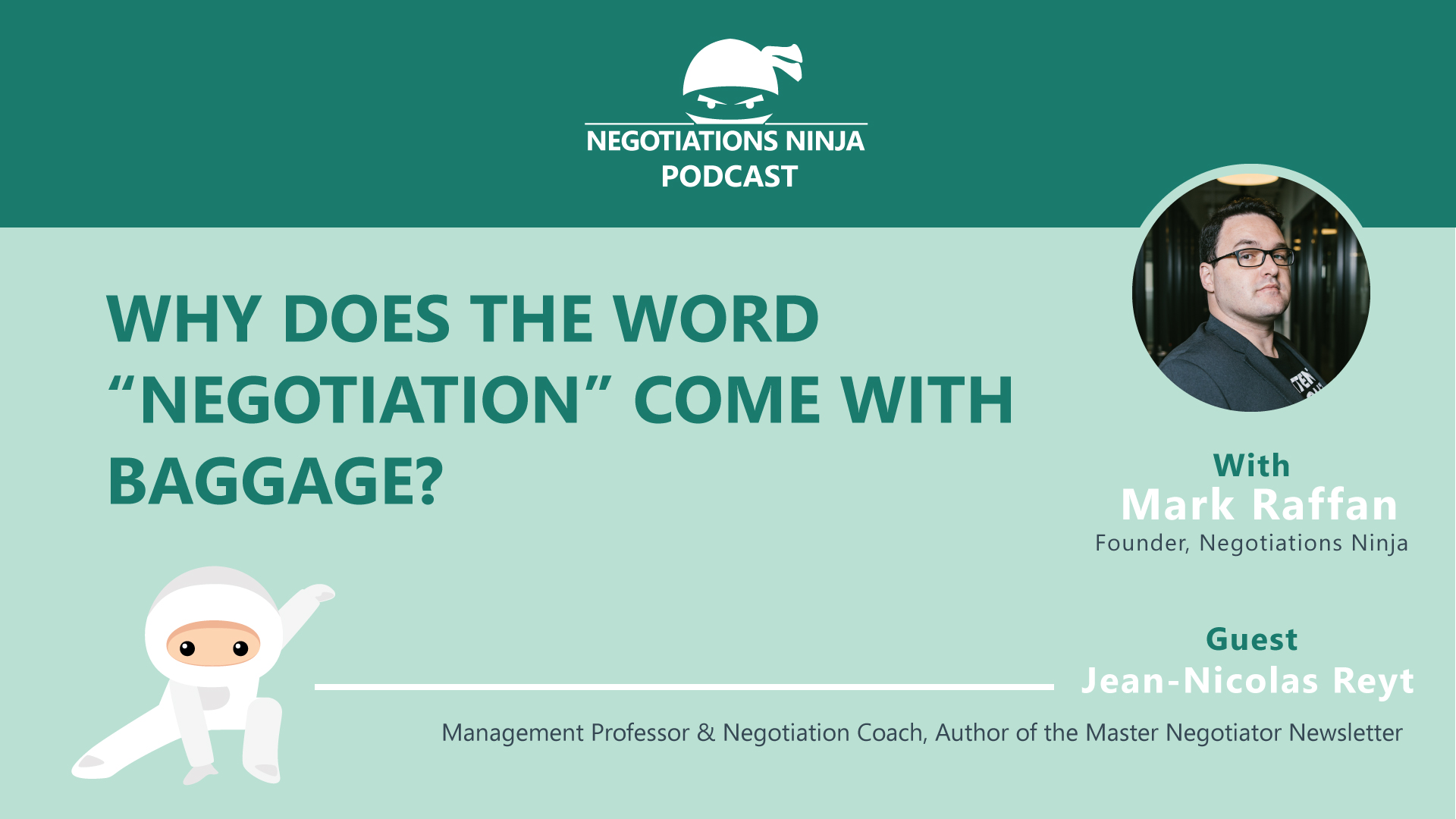A lot of baggage exists in the word negotiation. Why does it conjure negativity, tension, and frustration? How do you overcome that? Jean-Nicolas Reyt—assistant professor of organizational behavior at McGill University—returns to share some great advice in this episode of Negotiations Ninja.
Outline of This Episode
- [1:54] Why does the word “negotiation” come with baggage?
- [5:07] Why the word itself makes people feel dirty
- [11:24] Set a range of acceptable outcomes
- [15:30] Why HR should never handle job offers
- [20:22] Learn how to say a positive “no”
- [24:45] There needs to be a persuasion component
- [27:48] How to connect with Jean-Nicolas Reyt
Why does the word “negotiation” carry baggage?
Jean points out that there is research on negotiation that proves that people feel dirty about negotiation. It’s the same with networking. Everyone agrees you need to do it—but nobody wants to. Everyone agrees that it’s preferable to negotiate a job offer, but no one wants to do it. People objectively know that these things are a desired behavior, yet it’s avoided. It shows how much people dislike negotiation.
Jean notes that it’s a silent affliction. No one says, “I’m a terrible negotiator; I fold right away.” He thinks that the behaviors associated with negotiation—such as compliance or avoidance—are easier to embrace because no one else sees them. If you avoid a negotiation, only you know, right? It’s easy not to do it. No one is going to ask what you negotiated for your salary because it’s taboo to discuss it!
Jean works a lot with language and how certain words make people behave a certain way. Jean believes that language is the most powerful tool you can use to motivate people. If you want to ask someone to do something, there is a combination of words that you can use to help you reach your goal. The word “negotiation” is problematic because it’s abstract; no one really knows what it means. Jean thinks people hear “negotiate” and immediately think about complex negotiations and difficult conversations. If that’s what negotiation is, why would you want to negotiate?
The cold hard truth: you must ask or you’ll never receive
Jean works with young students who believe that they can simply do great work and they’ll be rewarded without asking for it. But he knows—and they soon learn—that they’ll never get what they don’t ask for. But those students—and most people, to be fair—find ways to justify their avoidance of negotiation.
Money is a finite resource that isn’t handed out readily. It’s given to the people who ask for it. Jean is the person that has to crush their hopes. He tells them the cold hard truth: that’s not how it works. If someone doesn’t give you money when you have leverage, why would they when you don’t?
I have to consistently remind people that you can’t expect anyone to give you anything in the business world unless you ask for it. People don’t just randomly go, “You know what, you do deserve another 20%.” It never happens. Your manager won’t think what you’re doing is exceptional—they just think it’s your job. They don’t think they owe you anything in return for doing your job well. If anything, they’ll think they got a great deal.
Why so many people settle for compliance
Asking for something or asserting a boundary is taboo. If you comply, the conversation can’t go south. People think the avoidance of negotiation is a risk-mitigation strategy—but it’s not. Jean’s students apply for a job and are told to sign a contract. If they say, “I want to negotiate,” they’re basically told they’re expendable. They can be replaced with the next person on the list. No one wants to be told that. Suddenly their self-worth takes a hit, and they feel they can’t walk away. But at the end of the day, you have to assert a boundary. If you say you want to get paid more, there’s a chance that a potential employer will walk away.
Set a range of acceptable outcomes
There’s a fear of rejection, ridicule, and a fear of being perceived differently. So how should you think about it? They contacted you for a reason. They’re talking to you for a reason. It’s because they want to do business with you. You should go into a negotiation with a range of acceptable outcomes regarding salary, price, terms, etc., that will help you decide where your walk-away point is. You have more power than you think you have. Don’t place your counterpart on a pedestal. Set a range of acceptable outcomes so when they make you an offer, you can say, “That doesn’t fit; I need more.” It helps.
It’s easy to see something from your own perspective. You may understand why you’re worth more than the salary you’re being offered but do they? Maybe you haven’t explained what you bring to the table properly. Of course, it’s scary, and you never know the outcome. But people are overly worried for the wrong reasons.
Resources & People Mentioned
- The Power of A Positive No by William Ury
Connect with Jean-Nicolas Reyt
Connect With Mark
- Follow Negotiations Ninja on Twitter: @NegotiationPod
- Connect with Mark on LinkedIn
- Follow Negotiations Ninja on LinkedIn
- Connect on Instagram: @NegotiationPod




